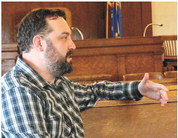Medford grapples with state reading mandates


The Medford school district is working to balance the demands of state law with what is best for individual students and families.
At the January 8 policy committee, committee members met with elementary principal Dan Miller and curriculum director Elizabeth Rachu to begin work on a policy to implement the Act 20 reading requirements.
The law mandates statewide reading standards for elementary level regarding student proficiency at the end of their third grade year. Under the law, as of September 1, 2027, students who do not meet reading proficiencies by the end of third grade cannot be promoted to fourth grade.
Miller noted that based on the district’s recent Forward exam results, 49% of the students are at meets expectations or above, leaving 51% of the students not meeting the proficiency levels and potentially subject to being held back. Miller noted that the Forward exam is a previous assessment test used by the state and the state is switching to a different assessment test which could show different results.
The intent of the law is to prevent students from falling through the cracks at the point in the elementary education where there is a shift from learning to read and reading to learn. Miller noted the Department of Public Instruction has been working on guidance for schools adjusting the mandate to hold back students to not include those with individualized educational plans, 504 plans and other accommodations. The law also does not allow holding back students who have previously been retained.
As part of the law, when a district implements the policy, it must have a
See MEDFORD on page 4 “highly intensive summer reading program” as a component of its summer school offerings.
“That makes me very nervous,” Miller said, noting that it would be a major shift from the largely enrichment based summer school program offerings and require additional workload for the teachers involved. He said he feels they should be paid as a full time teacher during that time rather than the reduced rate paid to summer school staff.
“People view summer school as being kind of fun,” said committee chair Jodi Nuernberger.
Rachu noted there has yet to be any guidance from the DPI about what the intensive summer school reading programs should look like. With that guidance expected to come later this spring, too late to be put into place for this year’s summer school program, committee members noted that any policy developed would go into effect for next school year rather than this one.
Miller said he has already been asked by parents if their students will be able to advance if they take summer school. He said he has told them no, not really because that is not the level of remediation that will be offered. He said if the district wanted to provide that level, they would need to know what that looks like.
Beyond the hurdles of determining what will meet the requirements of being an “intensive reading program,” the possibility of holding students back at the elementary level goes against what has been in practice in the district for a number of years. According to Miller, the school will typically only retain students in the kindergarten and prekindergarten. He noted that it is often having the students with the appropriate age group, such as those with birthdays later in the summer being held back to go from being the youngest in their grade to being older compared to their classmates. He said it is important for parents to look at long term impacts of holding students back such as increased chances of incarceration later in life, less of a chance for employment along with lower self esteem. He said if they are retaining students from advancing to the next grade, they need to be doing it for the right purpose.
“If you can’t come up with a good reason to tell your kid why, then you shouldn’t do it,” Miller said.
Miller noted that the research into holding back students shows that it doesn’t work, while there is other research that says not retaining them also doesn’t work. He said what works is what is done in that time to provide assistance.
Rather than scrapping all of the existing policy regarding retaining students, committee members favored keeping sections of it in place and incorporating the policy language being suggested by the state.
Miller and Rachu will continue to prepare a draft policy to come to the committee for a first reading by April with the goal of it being approved by the school board by the May meeting for implementation in the 2025-2026 school year.
It was noted the requirement for an intensive reading summer school program would likely have budgetary impacts due to the wages that would need to be paid for those teaching it.
Volunteering
Medford schools are continuing to work to balance encouraging staff to volunteer as emergency medical technicians and firefighters with the educational and financial needs of the district.
Committee members reviewed the first reading of review of the policy regarding staff serving as volunteers. The policy dates from 1991 and was last reviewed in 2019.
School board policies go through a multi-step approval process consisting of a first reading held at the committee and board level followed by a second reading at the committee and then at the board level. In Medford, the policy committee has a multi-year schedule of routinely reviewing policies to ensure the policies are being kept up to date with changing laws and other factors.
In the case of the volunteering policy, the discussion centered on compensation received for volunteer services performed during regular work hours. Current policy says any compensation must be turned over to the district for that time period.
The district currently has a teacher who serves on the fire department and a recently hired support staff member who in an on-call EMT. Firefighters and EMTs receive pay when called out to emergency scenes. The intent of the existing policy is to prevent people from double dipping by being paid for responding while also being paid by the district.
According to district administrator Laura Lundy, this is handled for the support staff position by them clocking out as a district employee for the time they are responding as an EMT.
For certified staff the issue becomes one of if the district needs to pay to bring in a sub or if it is for a short period and can be covered internally.
Committee member Aemus Balsis noted that as an investigator for the sheriff’s department it is routine for him to turn over to the county anything like subpeona or witness fees that he may receive for testifying at a trial.
Likewise with taking time to attend things like a school board committee meeting, they will take it as their lunch or they would be expected to make up the house later in the day.
Committee member Corey Dassow asked for the policy to be reviewed by the school’s attorney to make sure that it is legal for the district to require any compensation received to be turned over to the school district.
In other action committee members:
• Approved the second reading of a employee misconduct reporting policy with minor grammatical changes to the existing policy.
• Approved the second reading of the policy regarding employee lockers. Changes from the existing policy included adding nondiscrimination language and reformatting to eliminate bullet points and improve clarity.
• Approved the second reading of a policy for board and staff communication. Specifically the policy directs staff to work through their building administrators and the district administrator rather than talking with individual school board members. Committee member Aemus Balsis noted the policy is so that there is no blindsiding of anyone.
• Approved the second reading for a policy that requires testing for tuberculosis as a condition of employment. It was noted that the requirements for a pre-employment physical should only be for positions such as custodian which are more physical in nature. It was noted that the RVA employment polices already include that language.
• Approved on second reading a policy stating that threats or harassment of teachers by students would not be tolerated and should be reported immediately to building administration for investigation and action.
• Approved the first reading of a policy regarding staff participation in political activities. The policy prohibits staff from engaging in political activity during the workday, or using school supplies for political purposes, changing curriculum for political purposes or negatively impacting the student/teacher relationship.
• Approved the first reading of a longstanding policy regarding student and staff interaction with some language changes to update it.
• Approved the first reading of a policy regarding staff gifts and solicitations with some grammatical changes. This is another longstanding policy that was first adopted in March 1980. During discussion, it was noted that “significant material value” stated in the policy means something different to different people.






